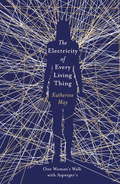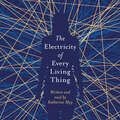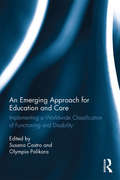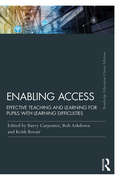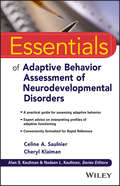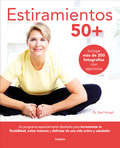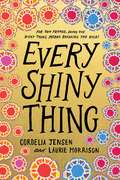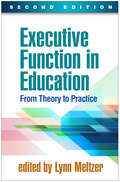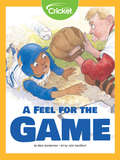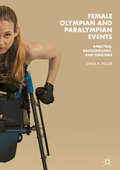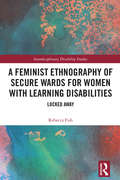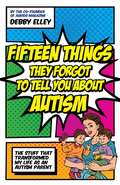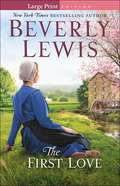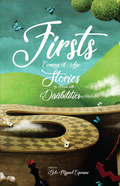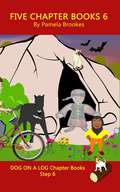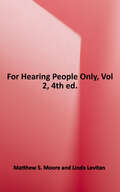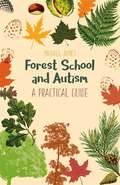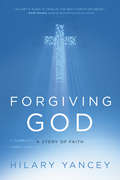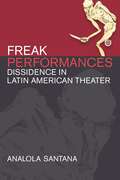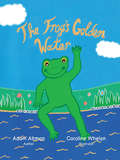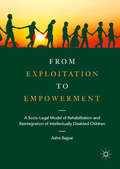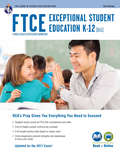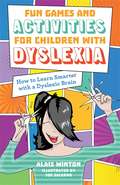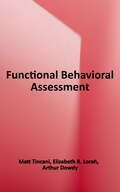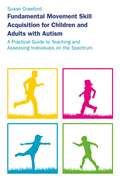- Table View
- List View
The Electricity of Every Living Thing: A Woman’s Walk in the Wild to Find Her Way Home
by Katherine MayPerfect for fans of The Salt Path and The Outrun, this book is a life-affirming exploration of wild landscapes, what it means to be different and, above all, how we can all learn to make peace within our own unquiet minds.'A windswept tale, beautifully told' Raynor Winn - The Salt Path 'A manifesto for the value of difficult people. I loved it' Amy Liptrot - The OutrunIn August 2015, Katherine May set out to walk the 630-mile South West Coast Path. She wanted to understand why she had stopped coping with everyday life; why motherhood had been so overwhelming and isolating, and why the world felt full of inundation and expectations she can't meet. Setting her feet down on the rugged and difficult path by the sea, the answer begins to unfold. It's a chance encounter with a voice on the radio that sparks a realisation that she has Asperger's Syndrome. The Electricity of Every Living Thing tells the story of the year in which Katherine comes to terms with her diagnosis. It leads to a re-evaluation of her life so far - a kinder one, which finally allows her to be different rather than simply awkward, arrogant or unfeeling. The physical and psychological journeys become inextricably entwined, and as Katherine finds her way across the untameable coast, she also finds the way to herself.What readers are saying about The Electricity of Every Living Thing:'This book showed a realistic view of how autism feels to some people, and it's explained so well''The astonishing sensitivity and awareness in her writing, both about the beautiful landscapes and nature around on her walks, and in relation to her family, friends and self put paid to many outdated myths about what it is like to be autistic''Compelling and transformative'
The Electricity of Every Living Thing: A Woman's Walk in the Wild to Find Her Way Home
by Katherine MayLast summer, Katherine May was approaching 40, feeling overwhelmed by motherhood and lacking connection with others, lost in a world of inundation and expectation. She had always felt different but this feeling was new. She wanted to get out, get free and find herself again - and so set about walking the rugged 450 mile South West Coast Path. However, this journey uncovers more than she ever imagined. By chance, en route to the walk, Katherine hears a radio show and the guests are speaking about Asperger's Syndrome. Things begin to fall into place - could this explain the white-outs, the excruciating confusion around social contact, the electric feeling of every living thing?After a formal diagnosis, Katherine begins to unravel this new perspective of her life. Through her physical journey comes an emotional one - of accepting who she is and moving forward. It's not just about walking or Asperger's; this is one woman's journey to feel free within herself, something that everyone can relate to.Read by Nathalie Buscombe(p) Orion Publishing Group 2018
An Emerging Approach for Education and Care: Implementing a Worldwide Classification of Functioning and Disability
by Susana Castro Olympia PalikaraAn Emerging Approach for Education and Care provides a synthesis of the extensive research that has been conducted worldwide about the International Classification of Functioning, Disability and Health for Children and Youth in education and care. The main purpose of the ICF is to provide a classification of functioning for adults and children with difficulties, considering their everyday lives, all the activities they perform and the environments they are embedded in, in addition to their health condition, which has been the traditional focus of Special Education provision in many countries. Each chapter presents an evidence-based study describing how the ICF has been used to improve the provision of services for children and young people with Special Educational Needs around the world. Moreover, each chapter is written by an expert on the ICF from a different country, thus providing an overview of how the ICF can be applied in international educational contexts with different educational and health systems and cultural backgrounds. This synthesis of world-leading research focuses on the ICF as a framework to approach assessment, intervention and classification for children and young people with SEN, whilst also providing practical examples of how it can be implemented. An Emerging Approach for Education and Care will be essential reading for academics, researchers and practitioners working on Special Educational Needs provision and rehabilitation. It should also be of great interest to those involved in the study of early childhood education, and for postgraduate students aspiring to work in these settings.
Enabling Access: Effective Teaching and Learning for Pupils with Learning Difficulties
by Barry Carpenter Rob Ashdown Keith BovairThis Routledge Classic Edition brings together widely experienced editors and contributors to show how access to a whole school curriculum can be provided for learners with moderate to profound and multiple learning difficulties. Along with a new appraisal of the contents from the editors, the contributors raise debates, illustrate effective teaching ideas and discuss strategies for providing a high-quality education for these pupils and a celebration of their achievements. The book also discusses the active involvement of family members and the learners themselves in these processes and considers issues surrounding empowerment of learners, professional development of the workforce and curriculum principles such as differentiation, personalisation, and engagement. Winner of the prestigious nasen/TES Academic Book Award in 1996, Enabling Access is an essential read for students and lecturers in higher education, and for teachers, support staff, and other professionals in all educational settings in the UK and abroad catering for these learners.
Essentials of Adaptive Behavior Assessment of Neurodevelopmental Disorders (Essentials of Psychological Assessment)
by Celine A. Saulnier Cheryl KlaimanA practical guide to adaptive behaviors across a range of neurodevelopmental disorders Adaptive behavior assessment measures independent living skills, including communication, social skills, personal care, and practical work skills. For individuals with intellectual disabilities, evaluation of these skills is a critical tool for measuring eligibility and can identify specific skills that must be learned before effective educational interventions can be implemented. Essentials of Adaptive Behavior Assessment of Neurodevelopmental Disorders describes the role of adaptive behavior in assessment and treatment, and provides clear guidance for measurement. Case samples provide real-world illustration of behaviors and assessment, and systematic comparison of various measures are presented and explained to better inform planning. Individual chapters outline specific adaptive behaviors across a range of neurodevelopmental disorders, giving clinicians, practitioners, students, and researchers a better understanding of diagnostic differentials and how to place independent skill programming in treatment and intervention. Plan intervention and treatment based on accessible measurement guidelines across a range of disorders Gain a deeper understanding of adaptive functioning specific to ADHD, autism spectrum disorders, disruptive behavior disorders, and genetic disorders Compare and contrast current measures to evaluate their strengths, weaknesses, and areas of overlap Quickly locate essential information with Rapid Reference and Caution boxes For individuals with neurodevelopmental disorders, adaptive behaviors are the keys to independence; without them, these individuals will perpetually struggle with achieving optimum independence without the basic skills needed to function at home, in school, and in the community. Assessment allows these skills to be factored in to treatment and intervention planning, and can help improve the outcomes of other intervention methods. Essentials of Adaptive Behavior Assessment of Neurodevelopmental Disorders clarifies the assessment of these important behaviors, helping clinicians make more informed decisions around diagnosis, education, and treatment planning.
Estiramientos 50+
by Dr Karl KnopfMejora tu flexibilidad, mejora tu salud. Un libro de ejercicios y rutinas de estiramientos para mantener un cuerpo sano y flexible pasados los 50. En Estiramientos +50 encontrarás más de 90 rutinas fáciles y seguras para mantener un cuerpo sano y flexible, sin importar la edad. Con solo diez minutos al día de práctica en casa, ayudarás a mejorar tu movilidad, sin dolor ni lesiones. Desde los calentamientos y flexiones más idóneos para el cuerpo hasta ejercicios con bandas elásticas, rodillos o fitballs: descubre los trucos clave para no dejar de estar en forma nunca.
Every Shiny Thing
by Cordelia Jensen Laurie MorrisonIn this beautifully constructed middle-grade novel, told half in prose and half in verse, Lauren prides herself on being a good sister, and Sierra is used to taking care of her mom. When Lauren’s parents send her brother to a therapeutic boarding school for teens on the autism spectrum and Sierra moves to a foster home in Lauren’s wealthy neighborhood, both girls are lost until they find a deep bond with each other. But when Lauren recruits Sierra to help with a Robin Hood scheme to raise money for autistic kids who don’t have her family’s resources, Sierra has a lot to lose if the plan goes wrong. Lauren must learn that having good intentions isn’t all that matters when you battle injustice, and Sierra needs to realize that sometimes, the person you need to take care of is yourself.
Executive Function in Education, Second Edition: From Theory to Practice
by Lynn MeltzerThis groundbreaking volume, now revised and updated, has given thousands of educators and clinicians a deeper understanding of executive function (EF) processes in typically developing children and those with learning difficulties and developmental disabilities. The book elucidates how PreK–12 students develop such key capacities as goal setting, organization, cognitive flexibility, working memory, and self-monitoring. Leading experts in education, neuroscience, and psychology explore the links between EF and academic performance and present practical applications for assessment and instruction. Exemplary practices for supporting students with EF difficulties in particular content areas--reading, writing, and math--are reviewed. New to This Edition *Expanded coverage of reading--chapters on recent fMRI research findings; working memory and reading; and self-regulation and reading comprehension. *Chapter on early childhood. *Chapter on embedding EF strategies in the curriculum *Updated throughout with a decade's worth of significant advances in research, theory, and educational best practices. See also Meltzer's authored book Promoting Executive Function in the Classroom, which provides easy-to-implement assessment tools, teaching techniques and activities, and planning aids.
A Feel for the Game
by John Sandford Myra SandermanCorey plays a special role on his baseball team—he’s their first deaf player! He and the coach communicate on the field by using sign language. Will Corey help the Northfield Huskies win the game and go on to the championship?
Female Olympian and Paralympian Events: Analyses, Backgrounds, and Timelines
by Linda K. FullerFemale Olympian and Paralympian Events is a groundbreaking book that examines women’s sports in the Olympic and Paralympic Games, which have long been underappreciated and under-analyzed. The book begins with a brief background on women’s participation in the Olympic Games and their role relative to the International Olympic Committee, then introduces the underlying Gendered Critical Discourse Analysis theory used throughout the book’s analysis before delving into a literature review of female Olympians and Paralympians’ events. It includes a listing of noteworthy “firsts” in the field, followed by individual discussions of twenty-eight Summer and seven Winter events, analyzed according to their historical, rhetorical, and popular cultural representations. Women’s unique role(s) in the various events are discussed, particular athletes and Paralympic events are highlighted, and original tables are also included. At the end of each section, affiliated organizations and resources are included in this invaluable referential volume.
A Feminist Ethnography of Secure Wards for Women with Learning Disabilities: Locked Away (Interdisciplinary Disability Studies)
by Rebecca FishWhat is life like for women with learning disabilities detained in a secure unit? This book presents a unique ethnographic study conducted in a contemporary institution in England. Rebecca Fish takes an interdisciplinary approach, drawing on both the social model of disability and intersectional feminist methodology, to explore the reasons why the women were placed in the unit, as well their experiences of day-to-day life as played out through relationships with staff and other residents. She raises important questions about the purpose of such units and the services they offer. Through making the women’s voices heard, this book presents their experiences and unique perspectives on topics such as seclusion, restraint, and resistance. Exploring how the ever present power disparity works to regulate women’s behaviour, the book shows how institutional responses replicate women’s bad experiences from the past, and how women’s responses are seen as pathological. It demonstrates that women are not passive recipients of care, but shape their own identity and futures, sometimes by resisting the norms expected of them (within allowed limits) and sometimes by transgressing the rules. These insights thus challenge traditional institutional accounts of gender, learning disability and deviance and highlight areas for reform in policy, practice, methodology, and social theory. This ground-breaking book will be of interest to scholars, students, policymakers and advocates working in the fields of learning disability and disability studies more widely, gender studies and sociology.
Fifteen Things They Forgot to Tell You About Autism: The Stuff That Transformed My Life as an Autism Parent
by Debby ElleyWhat if the things people need to know about autism is not the information they're getting? Combining myth-busting advice with personal experience, this book from the mother of autistic twins shares simple strategies to build children's confidence, communication, and independence. From sharing the joy of yodelling around shops at the weekend, to finding creative ways to communicate with both her verbal and her non-verbal sons, Debby Elley gives practical and fun tips for everyday living and shows that being autistic is just another way of being. Both witty and candid, the book discusses labels, meltdowns, acceptance, happiness and much more.
The First Love
by Beverly LewisIt's the summer of 1951, and Maggie Esh is in need of some hope. Sweet-spirite and uncommonly pretty despite struggling with illness, she is used to being treated kindly by the young men of her Old Order Amish church district. Yet Maggie wishes she were more like other courting-age girls so she could live a normal, healthy life. When tent revival meetings come to the area, the words of the preacher cause her to reconsider what she knows about faith. Can she learn to trust God even when hope seems a distant dream?
Firsts: Coming of Age Stories by People with Disabilities
by Belo Miguel CiprianiTake a step back in time with some of the best writers with disabilities as they recount their first adventure, their first heartbreak, and the first time the unexpected treaded into their life. From body transformations to societal setbacks, to love affairs and family trauma, Firsts collects the most thought-provoking and exciting stories of our time by people with disabilities. Contributors include Nigel David Kelly, Kimberly Gerry-Tucker, Caitlin Hernandez, Andrew Gurza, and David-Elijah Nahmod.
Five Chapter Books 6: Decodable Books for Phonics Readers and Dyslexia/Dyslexic Learners (DOG ON A LOG Chapter Books #Volume 6)
by Pamela BrookesDecodable Chapter Books for Phonics Readers and folks with a Dyslexic Learning Style. <P><P>This collection is the five books in Step 6 of the DOG ON A LOG Chapter book series. <P><P>The books are: <P><P>The Colt </br> The Gold Bolt </br> Hide In The Blinds </br> The Stone Child </br> Tolt The Kind Cat <P><P>Sight Words: </br> a, are, as, be, come, comes, could, do, does, for, from, go, goes, has, have, he, her, here, his, I, into, is, me, Ms., my, no, of, OK, onto, or, pull, pulls, push, put, puts, said, say, says, see, sees, she, should, so, some, talk, talks, the, their, there, they, to, walk, walks, want, wants, was, we, what, where, would, you, your, yours <P><P>Each book has about 1,390 to 2,000 total words <P><P>These are Step 6 Chapter books. <P><P>The DOG ON A LOG Books series are for phonics readers and folks with a dyslexic learning style. The words used reflect the inclusion of 1 to 3 new phonics rules in each step. There are five books at each step. <P><P>The chapter books are written in a chapter format with one picture in most chapters. They are longer, have more detail, and sometimes offer more complexity than the Let’s GO! Books. They’re great for practicing known and new phonics rules. They’re also just fun reading. <P><P>DOG ON A LOG Let’s GO! Books are shorter versions of DOG ON A LOG Chapter books. Let’s GO! books tell the same stories with about 8 pictures and only a few sentences per page. They’re perfect as an introduction to the new phonics rules or simply for fun reading for younger kids. <P><P>DOG ON A LOG Phonics Progression <P><P>Step 1: Consonants, primary sounds Short vowels Digraphs: ch, sh, th, wh, ck 2 and 3 sound words Possessive ‘s <P><P>Step 2: Bonus letters (f, l, s, z after short vowel) “all” –s suffix <P><P>Step 3: ang, ing, ong, ung, ank, ink, onk, unk <P><P>Step 4: Consonant Blends to make 4 sound words 3 and 4 sound words ending in –lk, -sk <P><P>Step 5: Digraph blends –nch to make 3 and 4 sound words Silent e, including "-ke" <P><P>Step 6: ild, old, olt, ind, ost <P><P>Step 7: 5 sounds in a closed syllable word plus suffix -s (crunch, slumps) 3 letter blends and up to 6 sounds in a closed syllable word (script, spring) <P><P>Step 8: Two syllable words with 2 closed syllables, not blends (sunset, chicken, unfit) <P><P>WATCH FOR MORE STEPS AND BOOKS COMING SOON <P><P>For information on upcoming books see dogonalogbooks.com or visit our Facebook page.
For Hearing People Only
by Matthew S. Moore Linda LevitanThis best-seller answers some of the most common questions about Deaf culture, the Deaf community, and how Deaf people communicate and live. The simple and entertaining question-and-answer format makes this book a good introduction to Deafness and Deaf studies and would make a great gift for hearing friends and associates. Expanded edition.
Forest School and Autism: A Practical Guide
by Michael JamesForest School's innovative outdoor approach offers specific benefits to learners with autism, including increased social skills, raised self-esteem and improved sensory function. This guide raises autism awareness amongst practitioners by providing practical and easy-to-follow advice for adapting Forest School activities for those with autism. For those coming from a mainstream Forest School background, the author offers an introduction to autism and shows what Forest School can offer people with autism - both children and adults - with first-person accounts that highlight its success with this group. The guide gives advice on the social and sensory benefits, offers practical advice on safety and on how to set up a Forest School and finally presents specific activities to be incorporated into practitioners' routines.
Forgiving God: A Story of Faith
by Hilary YanceyA young mother's life is forever changed and her faith in God is broken when her son in diagnosed with complex physical disabilities. Restore and grow your faith as you read about Hilary Yancey's personal journey back to God. Three months into her pregnancy with her first child, Hilary Yancey received a phone call that changed everything. As she learned the diagnosis-cleft lip and palate, a missing right eye, possible breathing complications-Hilary began to pray in earnest. Even in the midst of these findings, she prayed that God would heal her son. God could do a miracle unlike anything she had seen. Only when Hilary held her baby, Jack, in her arms for the first time did she realize God had given her something drastically different than what she had demanded. Hilary struggled to talk to God as she sat for six weeks beside Jack's crib in the NICU. She consented to surgeries and learned to care for a breathing tube and gastronomy button. In her experience with motherhood Hilary had become more familiar with the sound of her son's heart monitor than the sound of his heartbeat. Later, during surgeries and emergency trips back to the hospital with her crying, breathless boy, Hilary reproached the stranger God had become. Jack was different. Hilary was not the mother she once imagined. God was not who Hilary knew before. But she could not let go of one certainty-she could see the image of Christ in Jack's face. Slowly, through long nights of wrestling and longer nights of silence, Hilary cut a path through her old, familiar faith to the God behind it. She discovered that it is by walking out onto the water, where the firm ground gives way, that we can find him. And meeting Jesus, who rises with his scars to proclaim new life, is never what you once imagined.
Freak Performances: Dissidence in Latin American Theater
by Analola SantanaThe figure of the freak as perceived by the Western gaze has always been a part of the Latin American imaginary, from the letters that Columbus wrote about his encounters with dog-faced people to Shakespeare's Caliban. The freak acquires greater significance in a globalized, neoliberal world that defines the "abnormal" as one who does not conform mentally, physically, or emotionally and is unable or unwilling to follow the economic and cultural norms of the institutions in power. Freak Performances examines the continuing effects of colonialism on modern Latin American identities, with a particular focus on the way it has constructed the body of the other through performance. Theater questions the representations of these bodies, as it enables the empowerment of the silenced other; the freak as a spectacle of otherness finds in performance an opportunity for re-appropriation by artists resisting the dominant authority. Through an analysis of experimental theater, dance theater, performance art, and gallery-based installation art across eight countries, Analola Santana explores the theoretical issues shaped by the encounters and negotiations between different bodies in the current Latin American landscape.
The Frog’s Golden Water
by Adam Altman Caroline WhelanSkippy has enjoyed swimming in the pond's golden water his entire life. But now the golden sparkle has disappeared, so Skippy and his friends must find out what happened and return to pond to its former splendor. Come join Skippy on his adventure of discovery in his charming story.
From Exploitation to Empowerment: A Socio-Legal Model of Rehabilitation and Reintegration of Intellectually Disabled Children
by Asha BajpaiThis book presents the outcomes of a field action project at the Tata Institute of Social Sciences (TISS). Project Chunauti (English translation: Project Challenge) focused on a group of intellectually disabled, orphan children who were survivors of abuse, exploitation and neglect, and describes their journey toward empowerment. It offers a vision and a reproducible, adaptable model for rehabilitation that can foster the social re-integration of intellectually disabled orphans at institutions. As the implementation of laws is especially important for vulnerable groups, the book also outlines a socio-legal approach that not only impacts the children directly, but can also bring about policy level reforms.Project Chunauti was born out of the need to explore options for these children and to set standards for their care, protection, rehabilitation and social re-integration. The core objectives of the project were to provide support and services, including counseling, education, life skills and vocational skills training, as well as medical and psychiatric support to help them overcome the trauma of abuse and exploitation. Its further goal was to train the staff of state-run homes and state authorities, helping them prepare and implement care plans and rehabilitation, combat child sexual abuse and malnutrition, employ positive disciplining, and better understand disabilities. The book also draws on the Project team’s experiences of rolling out the replication process in Maharashtra. This book highlights the role of the courts, media and other stakeholders in the journey towards empowerment and justice. It is a combination of social-work methods, application and implementation of law and legal advocacy, as well as best practices for protecting children’s rights and developing rehabilitation and re-integration projects for intellectually disabled, orphaned children in India. The interventions detailed here provide a reproducible, adaptable model of intervention for children in institutional care across the country.
FTCE Exceptional Student Education K-12 (FTCE Teacher Certification Test Prep)
by Nancy Ann Tattner Maryann Gromoll Dr Ken SpringerREA's FTCE Exceptional Student Education K-12 Test Prep with Online Practice TestsGets You Certified and in the Classroom - for 2018-2019 and Beyond!Nationwide, more than 4 million teachers will be needed over the next decade, and all must take appropriate tests to be licensed. REA gets you ready for your teaching career with our outstanding library of Teacher Certification test preps. Fully updated to align with the Sept. 2017 exam changes, REA’s test prep is designed to help teacher candidates master the information on the FTCE Exceptional Student Education K-12 exam and get certified. It's perfect for teacher education students and career-changing professionals who are seeking certification in Florida to teach students with special needs. Written by Florida education experts, our complete study package contains an in-depth review of all the competencies tested on the FTCE Exceptional Student Education K-12 exam, including knowledge of foundations of exceptional student education, knowledge of assessment and evaluation, knowledge of instructional practices in exceptional student education, knowledge of the positive behavioral support process, knowledge of multiple literacies and communication skills, and knowledge of the transition process. . Two full-length online practice exams run under timed-testing conditions and provide automatic scoring and diagnostic feedback on every question to help students zero in on the topics and types of questions that give them trouble now, so they’ll be prepared on test day.The book includes the same two practice tests that are offered online, but without the added benefits of detailed scoring analysis and diagnostic feedback. This complete test prep package comes with a customized study schedule and REA's test-taking strategies and tips.This test prep is a must-have for anyone who wants to teach special needs students in Florida!
Fun Games and Activities for Children with Dyslexia: How to Learn Smarter with a Dyslexic Brain
by Alais Winton Joe SalernoDyslexic learner and teacher Alais Winton shows the positives of being dyslexic, and makes learning (and even spelling!) fun, with games and activities to make school learning simple. An inventive and practical book for children aged 7 to 13 who have been identified as having dyslexic tendencies, this book contains practical and creative activities for kids and teens to use, such as Spelling Sculptures and Hear it, Sing it, Beat it! The games and activities use the four different learning styles that work best with dyslexics - thinking in pictures, in movement, in music or socially. With funny cartoons, which appeal to visual thinkers, and a section with advice on how parents and guardians can aid learning, this is an essential toolkit for any dyslexic child.
Functional Behavioral Assessment
by Matt Tincani Elizabeth R. Lorah Arthur DowdyDescribes how to conduct functional behavioral assessment (FBA) as an information-gathering process to develop successful function-based intervention plans for children and youth with autism spectrum disorder (ASD)
Fundamental Movement Skill Acquisition for Children and Adults with Autism: A Practical Guide to Teaching and Assessing Individuals on the Spectrum
by Susan Crawford David SugdenThis innovative manual sets out advice on fundamental movement skill acquisition (FMS) and its benefits for improving physical, verbal and social skills for people with Autistic Spectrum Disorder (ASD). Improving FMS can help prevent long term health issues, and increase opportunities for social engagement and independence. The book explores the basic skills of movement (running, catching, throwing, and balance) and how to observe, teach and assess FMS in children and adults with ASD. There are sections on how to develop and implement a programme for individuals to guide their personal development, and information on planning and tools for assessment are included. A much needed guide on how to combat impairment of FMS, the book also highlights the numerous benefits of such an approach in relation to behaviour, lifestyle, health and education.
